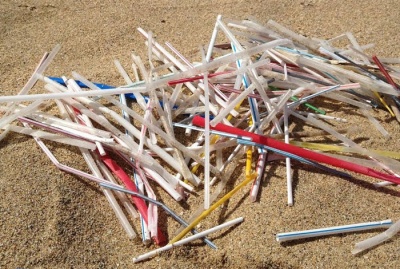Scotland proposes plastic straw ban by end of 2019
Scottish Environment Secretary Roseanna Cunningham has revealed that the Scottish Government is seeking to introduce a ban on plastic straws by the end of 2019.
 Cunningham, speaking to the Sunday Mail, which launched its ‘Last Straw’ campaign last month to ban plastic straws in Scotland, said that the “writing is on the wall” for plastic straw producers and that a plastic straw ban could feasibly be implemented by the end of 2019.
Cunningham, speaking to the Sunday Mail, which launched its ‘Last Straw’ campaign last month to ban plastic straws in Scotland, said that the “writing is on the wall” for plastic straw producers and that a plastic straw ban could feasibly be implemented by the end of 2019.
The proposed ban is but the latest action in Scotland’s fight against plastic waste, with the Holyrood government announcing in January that it was considering an outright ban on the sale and manufacture of plastic cotton buds in order to mitigate against marine plastic pollution.
In advance of a law, Cunningham encouraged organisations to ban plastic straws before potentially being legally obliged to do so, saying: “Legislation can’t be achieved overnight, which is why I don’t want to discourage people from action. I would strongly encourage the big manufacturers of straws that the writing is on the wall and they need to be thinking about alternatives now.”
The current direction of travel and momentum is behind the significant reduction of our use of single-use plastics, spurred on by David Attenborough’s BBC series Blue Planet II, many organisations such as Wetherspoons, the BBC and even the Queen’s royal residences have either banned or committed to banning single-use plastics in their operations or on their property.
Cunningham doesn’t want to just stop at plastic straws, either, with other problematic products in her crosshairs: “The first question I asked my officials was, ‘Can’t we just add other things to this list?’ They said we would have to look at each item one by one. There are different issues, for example, whether they are manufactured in Scotland and the implications for people’s jobs. It’s not as simple as producing a long list. If it was, I would have done it.”
Commenting on the proposed ban, a spokesperson for the Scottish Government said: “We are committed to ending Scotland’s throwaway culture and are considering how we can reduce single-use items like plastic straws. There are obviously a number of legislative, financial and accessibility issues to consider when it comes to banning plastic straws, however it is our intention that we will be in a position to confirm definitive plans over the coming months.
“As our Programme for Government sets out, we will be appointing an expert panel to advise on the use of charges and other measures to reduce use of single-use items and we will call on them for advice on plastic straws as one of their first priorities. We will also appoint a disability adviser to the panel to provide advice and ensure that we do not inadvertently disadvantage groups and that appropriate alternatives are in place."

“Campaigns such as the Sunday Mail’s to end plastic straws play an important role in raising awareness of this pressing environmental issue. The UK Government now also need to up their ambition on single-use plastics – we can’t wait another two decades to eliminate them.”
Not so fast
However, although the intentions are noble, legislative action from the Scottish Government may not be so straightforward in practice.
While Cunningham stated that legislation would be easier if there were no plastic straw producers in Scotland, the government would do well to anticipate any challenges to a ban on the basis of the free movement of goods within the EU, as was threatened by Pack2Go, an organisation representing European packaging manufacturers, against the French Government after it passed a law in 2016 banning disposable plastic plates, cutlery and cups by 2020, with 50 per cent of the material used to make such disposable items having to be biodegradable.
Furthermore, “easily available alternatives” to plastic, as Cunningham puts it, must be available to ensure a smooth transition away from single-use plastics, with leading figures in the French packaging industry criticising the French law last year for its impracticability due to the lack of proper biodegradable alternatives, with Emmanuel Guichard, Director General of Elipso, a trade organisation representing French plastic packaging producers, branding it a “copy and paste job” of the previous plastic bag ban, and even Christophe Doukhi-de Boissoudy, CEO of Novamont France, the French arm of the bioplastics multinational, said of the law that its “intentions were good, but impossible in practice”.
There is also the matter of whether compostable alternatives to plastic straws being used by those organisations that have pledged to go plastic free are actually being composted. An investigation by Footprint, a news service reporting on responsible business and sustainability for the foodservice, hospitality and grocery supply chains, recently claiming that it had found ‘little evidence’ that eco-friendly straws were actually being composted, raising doubts over the integrity of plastic-free pledges.




